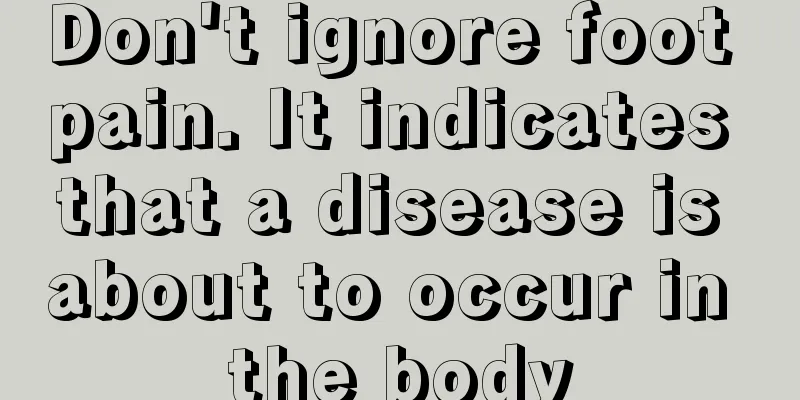Don't ignore foot pain. It indicates that a disease is about to occur in the body

|
As the saying goes, a journey of a thousand miles begins with a single step. If our feet are not well protected, we will be unable to move forward, so it is very important to protect our feet. But if you have pain in your feet, you must not ignore it. It also indicates that there are problems in other parts of your body. Swollen feet, foot pain, and foot cramps are all signs of problems in our body, so we must pay attention to them. 1. Swollen feet In addition to swollen feet caused by standing, sitting or squatting for a long time, and edema that occurs in women during menstruation and pregnancy, unexplained swelling of the feet may be a symptom of heart disease, endocrine disease and other diseases. 2. Numbness in both feet Numbness in the hands and feet of healthy people is mostly caused by the feet being in the same posture for a long time. This symptom will disappear on its own, but if it persists for a long time, or recurs, sometimes light and sometimes severe, it may be pathological numbness caused by a disease, such as thromboangiitis obliterans, and should be taken seriously. 3. Leg cramps If you always have leg cramps when you sleep, you should increase your intake of calcium, potassium and magnesium. When your leg cramps, you can massage the painful area or apply cold compress. To avoid cramps, stretch your legs before going to bed and drink a glass of hot milk. 4. Thick and yellow toenails Usually caused by a fungal infection, people are unaware of it, but the infection can quickly spread to all toenails, causing them to have an unpleasant odor and become darker in color. Experts say that if the nails are brittle, it means athlete's foot infection, but if the nails are just thick, it may be a damaged toe. 5. Pain in the soles of feet When walking, standing or pressing, the big toe joint and the sole of the foot are painful but there is no redness or swelling. This may be due to injury to the plantar muscles. You can soak your feet in hot water every night. If the sole of the foot hurts and the third or fourth toe also hurts, it may be caused by wearing high heels for a long time. It is recommended to alternate between wearing high heels and flat shoes. If you must wear them, it is best to choose shoes with wide toes and thick soles. If you have unexplained foot pain and also have symptoms such as thirst, frequent urination, hunger, and weight loss, you should consider whether you have diabetes. 6. Heel pain The vast majority of heel pain is caused by ligament inflammation, and ill-fitting shoes are the main cause. Wearing shoes with soles that are too hard, too soft, or too thin for a long time will cause problems. In addition, obese people are also prone to heel pain. Experts point out that to protect your heels, you must first choose the right shoes. The shoes you buy must fit your feet, leaving a horizontal finger's distance in front of your toes, and avoid wearing flat shoes with soles that are too thin. |
<<: How to solve the problem of hardening and bulging infusion blood vessels?
>>: What should I do if my arm hurts during infusion?
Recommend
The benefits of learning boxing
For men, strengthening their exercise in one aspe...
Can cherries lower blood sugar?
Cherry is a fruit that ripens in summer, and the ...
Right temporal lobe glioma?
Glioma is a very common malignant intracranial tu...
How to wash stained clothes? 10 ways to easily remove stains
Whether clothes are neat and clean has a great im...
What ingredients can be baked on a baking tray
Many people want to try making barbecue at home. ...
How to pickle sweet and sour garlic
If you cook often, onions, ginger and garlic can ...
What are the early symptoms of breast cancer? Two common high-risk groups for breast cancer
Early detection of breast cancer can lead to earl...
How to deal with itchy scalp and dandruff?
Hair is the hair on the top of people's heads...
What diseases should you be alert to if you suddenly gain weight
For the human body, any sudden changes require ou...
The most reasonable treatment plan for thyroid cancer
What is the most reasonable treatment for thyroid...
To treat lung cancer, you need to know the method
The treatment of lung cancer is a concern for man...
Why does my mouth always blister?
People will encounter some diseases in their live...
The effect of salt compress on sebaceous cyst
There are actually many ways and tricks in life t...
How to find contact lenses if they fall on the ground?
Contact lenses are a good helper for modern myopi...
Is oral herpes contagious? People with low immunity should pay attention
Oral herpes is caused by a viral infection. Clini...









